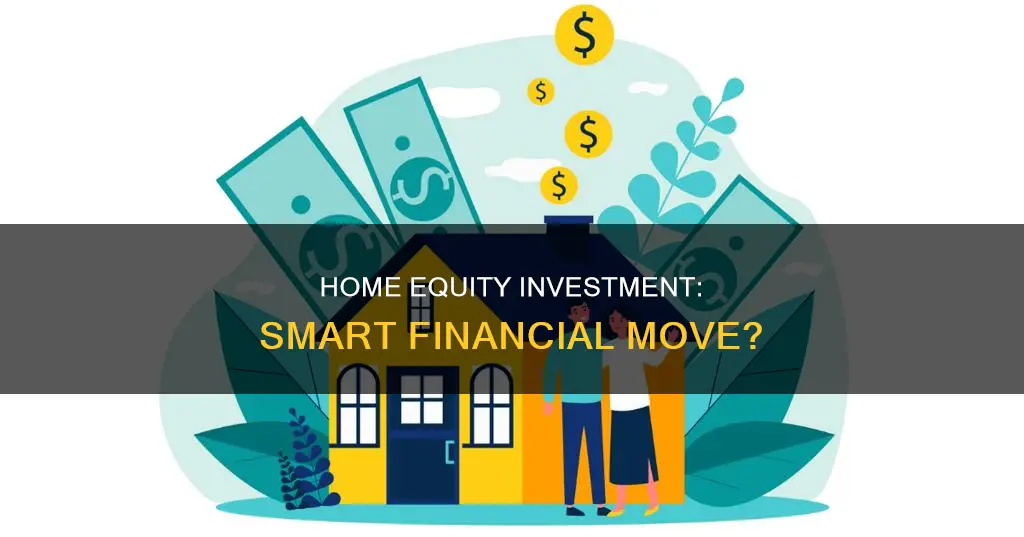
Home equity investment is a way to access the cash value of your home without taking on a new mortgage. Homeowners can sell a portion of their future home equity in exchange for a lump sum payment. This strategy can be particularly useful for those who need cash but cannot handle the monthly payments that come with a traditional home equity loan or do not qualify for a HELOC. However, it is important to note that if your home value increases substantially, you may end up paying the investor a high rate of return. Additionally, home equity investments can be complicated to understand and may not be allowed by your mortgage lender.
What You'll Learn

Home equity investment vs. other options
Home equity investment is a strategy for turning your home equity into cash. It is also called a home equity sharing agreement. It allows you to sell a portion of your home's future value in exchange for a lump-sum payment.
There are various ways to tap into your home equity. Here are some of the options available:
Home Equity Investment
Home equity investment is a financial agreement that allows homeowners to tap into the equity in their homes in exchange for a share of their home's future appreciation. There are no monthly payments or interest charges associated with this option. Instead, you will buy out the investor's equity share at the end of the term or when you sell your home or refinance. The major benefit of this option is that it has less stringent credit and income requirements than other home equity products, such as home equity loans or lines of credit (HELOCs). However, you may end up losing out on significant wealth if your home appreciates considerably in value.
Home Equity Loan
A home equity loan is a type of second mortgage where you receive a lump sum upfront and then make regular monthly repayments over the loan term, usually at a fixed interest rate. This option typically has lower interest rates compared to credit cards or personal loans, but the repayment adds to your monthly expenses. Additionally, if you cannot repay the loan, you could face the risk of foreclosure.
Home Equity Line of Credit (HELOC)
A HELOC is a revolving line of credit, similar to a credit card, that comes with a variable interest rate. It allows you to borrow, repay, and re-use funds as needed during a set draw period. Once the draw period ends, you will need to start repaying the balance and interest charges in full. A HELOC can be ideal for long-term projects or situations where the final cost is indefinite. However, the variable interest rate can be stressful for borrowers who prefer fixed-rate loans.
Cash-Out Refinance
With a cash-out refinance, you replace your current home loan with a new mortgage for a higher amount. You then pocket the difference in cash, which can be used for various purposes. This option typically offers the lowest interest rates. However, it also increases your overall debt burden, and you will need to pay closing costs.
Reverse Mortgage
A reverse mortgage is an option for borrowers aged 62 or older with substantial home equity. Instead of making payments to the lender, the lender makes payments to you. The loan balance, plus interest, becomes due when you move out, sell the home, or pass away. This option does not require monthly repayments while you live in the home, and there are no income or credit score requirements. However, it is important to note that you will need to have your primary mortgage substantially paid off to qualify.
In conclusion, there are several options available for tapping into your home equity, each with its own advantages and disadvantages. The best option for you will depend on your financial situation, goals, and long-term plans as a homeowner. It is always a good idea to compare and contrast different alternatives before making a decision.
Direct vs Portfolio Investment: Understanding the Key Differences
You may want to see also

Pros and cons of home equity investment
Home equity investment can be a good option for those with low credit scores or inconsistent earnings who need to access cash quickly. However, as with any financial product, there are pros and cons to consider before making a decision.
Pros of Home Equity Investment
- Lower credit score requirements than other equity products
- No monthly payments or interest costs
- No minimum income requirements
- Access to a large lump sum of cash
- No restrictions on the use of funds
- Flexible repayment options
- Second properties may be eligible
Cons of Home Equity Investment
- Sharing future appreciation with the investment company
- Longer application process
- Not available in all locations or for all property types
- Risk of foreclosure if repayment terms are not met
- Unpredictable repayment amount due to fluctuating home values
- May need a large share of equity to qualify
- Various upfront fees and closing costs
Overall, while home equity investment can be a useful tool for some homeowners, it is important to carefully consider the potential benefits and drawbacks before making any decisions. It is also essential to compare home equity investment with other financing options, such as home equity loans or refinancing, to determine the best course of action for your financial needs.
Why You Need an Investment Manager: Expert Guidance
You may want to see also

How to calculate home equity
Home equity is the difference between what your home is worth and how much you still owe on your mortgage. As you pay down your mortgage and your home’s value increases, your equity stake grows.
Step 1: Estimate your home’s value
You can find out how much your home is worth using a number of methods. Online home price estimators are an easy and free way to get an estimate of your home’s worth. Keep in mind that these are estimates and not the value a lender will assess. When you apply for a home equity loan or line of credit, an appraisal of the value of your home will be done. The appraisal will consider factors such as the size of your home, the number of bedrooms and bathrooms, property location, and surrounding area.
Step 2: Find out what you owe
The next step is to find out the outstanding balance on your mortgage. This information can be found on your most recent statement, your lender or servicer’s online dashboard, or by calling them directly.
Step 3: Take the difference to determine your equity
Once you have your home’s value and your mortgage balance, simply subtract the latter from the former to determine your equity. For example, if your home’s current value is $410,000 and you have a $220,000 balance remaining on your mortgage, your equity would be $190,000.
Step 4: Calculate how much you can borrow
You won’t be able to borrow the full amount of your home equity. Many lenders will allow you to borrow up to 80% of your home’s value. Using the example above, that would be $328,000. Subtract what you still owe on your mortgage ($220,000), and you’d have $108,000 of tappable equity.
It’s important to keep in mind that home equity loans come with closing costs, including fees for loan origination, an appraisal, a credit report, and title searches.
Indie-Gogo Campaigning: Strategies for Investment Success
You may want to see also

Best ways to use home equity
Home equity is a valuable asset that can be used in several ways to enhance your financial position. Here are some of the best ways to use your home equity:
Home Renovations
Reinvesting in your property through strategic renovations is one of the most effective ways to use your home equity. Upgrading key areas such as the kitchen and bathroom or adding energy-efficient features can enhance your living experience and boost your home's value. This increases your property's market value, leading to a higher return on investment when it's time to sell.
Debt Consolidation and Refinancing
Home equity loans or cash-out refinancing can be used to consolidate multiple high-interest debts. This simplifies your monthly payments and saves you money in interest over time. Home equity loans and HELOCs tend to have lower interest rates than personal loans or other debt consolidation options, making it cheaper to borrow from your home equity.
Education Funding
Using home equity to invest in education, either for yourself or your children, can be rewarding. Funding education expenses through a home equity loan or HELOC allows you to benefit from lower interest rates compared to other forms of borrowing.
Emergency Fund
Your home equity can serve as a financial safety net during unforeseen challenges. Tapping into your home equity can provide readily available funds without resorting to high-interest debt from credit cards or liquidating other investments.
Real Estate Investing
For those interested in real estate, using home equity to invest in additional properties, such as rental properties or real estate development, can be lucrative. This helps to diversify your portfolio and generate passive income over time.
Other Options
Other ways to use your home equity include:
- Business expenses: Using home equity to start or grow a business can provide access to lower interest rates compared to business loans.
- Investment opportunities: Using home equity to invest in the stock market or buy a rental property is risky but can be considered with careful planning.
- Retirement income: Tapping into home equity can supplement retirement income, but it's important to have a plan for repayment, especially if your income has decreased.
- Vacation funding: While risky, home equity loans can provide lower interest rates than credit cards for funding vacations.
When deciding how to use your home equity, it's important to carefully plan and make informed decisions. Both HELOCs and home equity loans have their advantages and considerations, so choosing the right option depends on your financial situation, preferences, and the purpose of the funds.
Understanding Investment Management with SAP
You may want to see also

Worst ways to use home equity
Home equity is the difference between how much your home is worth and how much you still owe on your mortgage. Borrowing against your equity means tying new debt to your house, exposing yourself to additional foreclosure risk. Here are some of the worst ways to use home equity:
Daily expenses
If you're finding it difficult to manage your monthly bills, taking on more debt will only create a larger problem. Instead, contact your lender to request a mortgage forbearance or a loan modification. Lenders will work with you to avoid falling behind on your mortgage payments.
Vacations
Exploring Tahiti in French Polynesia may be an unforgettable experience, but it's not worth financing with home equity. Unless you think a trip is worth losing your home over, it doesn't make sense to trade a week of rest for a second mortgage.
Buying depreciating assets
Think twice about using your home equity to buy a brand-new car or furniture. These items depreciate in value over time, and you can't truly enjoy them if you lose your home.
Gambling
Don't be fooled into thinking you'll come out ahead when gambling with home equity. You're more likely to lose what you gamble, and that's a painful loss when it's your home on the line.
Market investments
Investments are never a sure thing; you could lose the money you've taken from your home.
Cryptocurrency
Like gambling or market investments, cryptocurrency is too risky to put your home equity on the line.
How Much Should You Invest in Managed Accounts?
You may want to see also
Frequently asked questions
A home equity investment is a financial product that allows you to sell equity in your home in exchange for a lump sum cash payment. It is also known as an "equity sharing agreement".
With a home equity investment, you sell a portion of your future home equity and, in return, receive a lump sum of cash. There are no monthly payments, but you will have to repay the investor at the end of the term, usually within 10 to 30 years. The amount repaid includes a percentage of any home equity gains made during the term.
A home equity investment can be a good option if you want to increase your cash flow without taking on more debt or making monthly payments. It also tends to have more forgiving eligibility criteria. However, if your home value increases substantially, you may end up paying the investor a high rate of return. Home equity investments can also be complicated to understand and may not be allowed by your mortgage lender.
A home equity investment may be suitable for homeowners who want to extract equity and increase cash flow without taking on more debt or making monthly payments. It can be particularly attractive to those with a high debt-to-income ratio or less-than-excellent credit.
Alternatives to a home equity investment include a home equity loan, a home equity line of credit (HELOC), a cash-out refinance, or a reverse mortgage. These options may provide access to your home's equity without giving up a portion of future equity gains.







